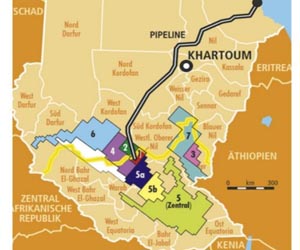BLOG
December 28th, 2010
Via Terra Daily, an interesting article on the potential that a new Sudan state will threaten to upend the Nile sharing structure already under pressure. As the report notes:
 |
The expected emergence of a new state in southern Sudan following a January independence referendum is causing alarm in Cairo because the signs are the infant state will join other African countries battling Egypt for a greater share of the Nile River’s waters.
The southern Sudan leader, Salva Kiir, recently visited President Yoweri Museveni of Uganda, one of the upstream states opposed to Egypt’s control of the Nile waters, to discuss building hydroelectric power stations to enhance development of the infant state.
That is guaranteed to incense Cairo, which vehemently opposes any upstream projects that would diminish the flow of the Nile, which runs into the Mediterranean at Alexandria.
Sudan lies astride the middle reaches of the Nile, the source of 90 percent of Egypt’s water.
The White Nile, which joins the Blue Nile in Khartoum, Sudan’s capital, runs through southern Sudan. The Blue, which rises in the Ethiopian highlands, supplies more than two-thirds of the Nile’s water flow.
The upstream states — Uganda, Tanzania, Kenya, the Democratic Republic of Congo, Burundi, Rwanda and Ethiopia — demand that Egypt and Sudan relinquish long-held rights to 74 percent of the Nile’s waters.
These are enshrined in a 1929 agreement from the British colonial era. Egypt and Sudan refuse to give an inch.
In May, most of the upstream states grouped together in a new alliance and gave the downstream states a year to agree to a more equitable share of the Nile waters.
They need this because of burgeoning populations, a growing demand for electricity and irrigation for food production and an imperative to stimulate development.
Under the 1929 agreement, Egypt had veto power over all upstream projects that involve the Nile’s flow, particularly dam construction.
AllAfrica.com reported that Museveni told Kiir Uganda wants more dams to boost its generating power from 300 megawatts to 3,800 MW over the next five years.
“We also have plans to generate 17,000 MW by 2025,” the Ugandan leader disclosed.
According to U.S. diplomatic cables unveiled by WikiLeaks, Egyptian President Hosni Mubarak sought to convince Washington to postpone the scheduled Jan. 8 independence referendum in southern Sudan because of the potential loss of Nile water.
Ethiopia, the source of the Blue Nile, has strong links with the Sudan People’s Liberation Movement, which has ruled southern Sudan since a 2005 peace agreement that ended decades of civil war between the region, mainly Christian and animist, and the Arab Muslim north.
So do Kenya and Uganda, which supported the southerners’ struggle against the Khartoum regime of President Omar al-Bashir.
Indeed, Ethiopia’s leader, Prime Minister Meles Zenawi, one of the most militant of Egypt’s critics, claimed in November that Cairo sought to destabilize his country by supporting rebel groups opposed to his regime.
That accusation, devoid of any diplomatic discourse, apparently caught the Egyptians unawares and marked a sharp escalation in the diplomatic war of words over the Nile.
Cairo denied that. But Egypt and other Arab states provided support for Eritrean separatists who fought for independence from Ethiopia in 1961-91.
Zenawi went on to warn Egypt it would be defeated if it invaded Ethiopia, presumably through Sudan or Eritrea, which border Ethiopia.
However, undertaking such a complex operation is difficult to imagine, even though Egypt considers the Nile a vital national security issue.
“Nobody who has tried that has lived to tell the story,” Zenawi cautioned.
Egypt did try to invade Ethiopia in the 19th century after it had conquered Sudan. But that campaign ended in failure in 1875.
Why Zenawi would want to raise the temperature on the Nile issue right now is not entirely clear.
But he has domestic problems and the Nile provides a diversion. He has infuriated Egypt by building five huge dams on the Nile over the last decade and has started construction of a new $1.4 billion hydroelectric facility.
Osman Mirghani, senior editor-at-large of the Saudi-owned Asharq al-Awsat newspaper, was concerned enough to observe that the Nile question “is something that in the near future may come to overshadow all other regional issues.”
“Anybody listening to the statements, observing the frantic maneuvers, or watching the growing tension, might already feel that the Nile Water War has begun in earnest.”

